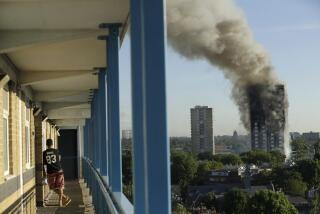Review is said to find safety failures at BP
- Share via
BP, under pressure because of a refinery explosion that killed 15 workers, suffered from systemic safety failures, according to a report by a committee headed by former Secretary of State James A. Baker III.
The Baker panel found fault with the handling of safety issues by upper management at London-based BP, including top executives, said a person who has seen the report and asked not to be named because it is not yet public. The committee was set up after a March 2005 blast at BP’s Texas City, Texas, plant.
The report may bolster the view of lawyers who are suing on behalf of those killed or injured in Texas City. They have argued that more senior BP executives should shoulder the blame for the safety failings. BP spokesman Neil Chapman said he would have no comment on the Baker report before its formal publication in Houston today.
“We have always maintained throughout this litigation that the ultimate responsibility for the tragedy of March 2005 fell at the feet of corporate executives high in the chain of command, from the plant manager in Texas City to CEO Lord John Browne,” said Houston attorney Brent Coon, who won more than $38 million for a client who lost both parents in the accident.
Tony Hayward, Browne’s successor, faces the task of restoring the confidence of investors, employees and regulators after a string of missteps. BP last week named Hayward, who is head of exploration and production, as its next chief executive and moved Browne’s retirement up by more than a year.
In addition to the Texas City tragedy, BP last year shut part of the Prudhoe Bay oil field in Alaska after a spill, and it delayed the start of its Thunder Horse oil platform in the Gulf of Mexico. The company has also been accused by U.S. regulators of trying to manipulate fuel markets.
BP shares have fallen 17% in the last year. Rival Exxon Mobil Corp.’s shares have gained 18%.
The Baker report also said executives relied too much on safety statistics from the U.S. refineries. It makes recommendations for improvements, including putting an outside body in charge of monitoring safety at the BP plants, said the person who has seen the report.
The conclusions of the Baker report were first reported in the Wall Street Journal.
BP has taken responsibility for the Texas City accident and set aside $1.6 billion to compensate victims. The refinery was closed for months after Hurricane Rita in September 2005 as the company made improvements to boost safety.
The U.S. Chemical Safety Board, which recommended in August 2005 that the independent review committee be established by BP, concluded in October that BP knew about safety lapses at Texas City years before the explosion and failed to act. BP tapped Baker in October to run the safety review.
Browne at the time said the review was part of an effort to prevent an accident like Texas City from “ever happening again by ensuring that safety practices at our operations are effective and comprehensive.”
In addition to Browne, who is retiring in July, the company’s vice president for global refining, Mike Hoffman, is leaving this year. BP’s head of U.S. operations, Ross Pillari, was replaced last year by Robert Malone.
Baker, a senior partner with law firm Baker Botts in Houston, was also co-chairman of the bipartisan Iraq Study Group that in December recommended withdrawing U.S. troops from combat by early 2008.
John Williams, a spokesman for Baker, didn’t return a voicemail asking for comment.
BP has five major refineries in the country: Texas City; Carson; Whiting, Ind.; Cherry Point, Wash.; and Toledo, Ohio. The plants can process a total of almost 1.5 million barrels of oil a day, according to the U.S. Energy Information Agency. That’s equal to about 9% of total U.S. refinery capacity.
Texas City is BP’s largest U.S. refinery and the country’s third largest, with a capacity of 437,000 barrels a day.
More to Read
Inside the business of entertainment
The Wide Shot brings you news, analysis and insights on everything from streaming wars to production — and what it all means for the future.
You may occasionally receive promotional content from the Los Angeles Times.










